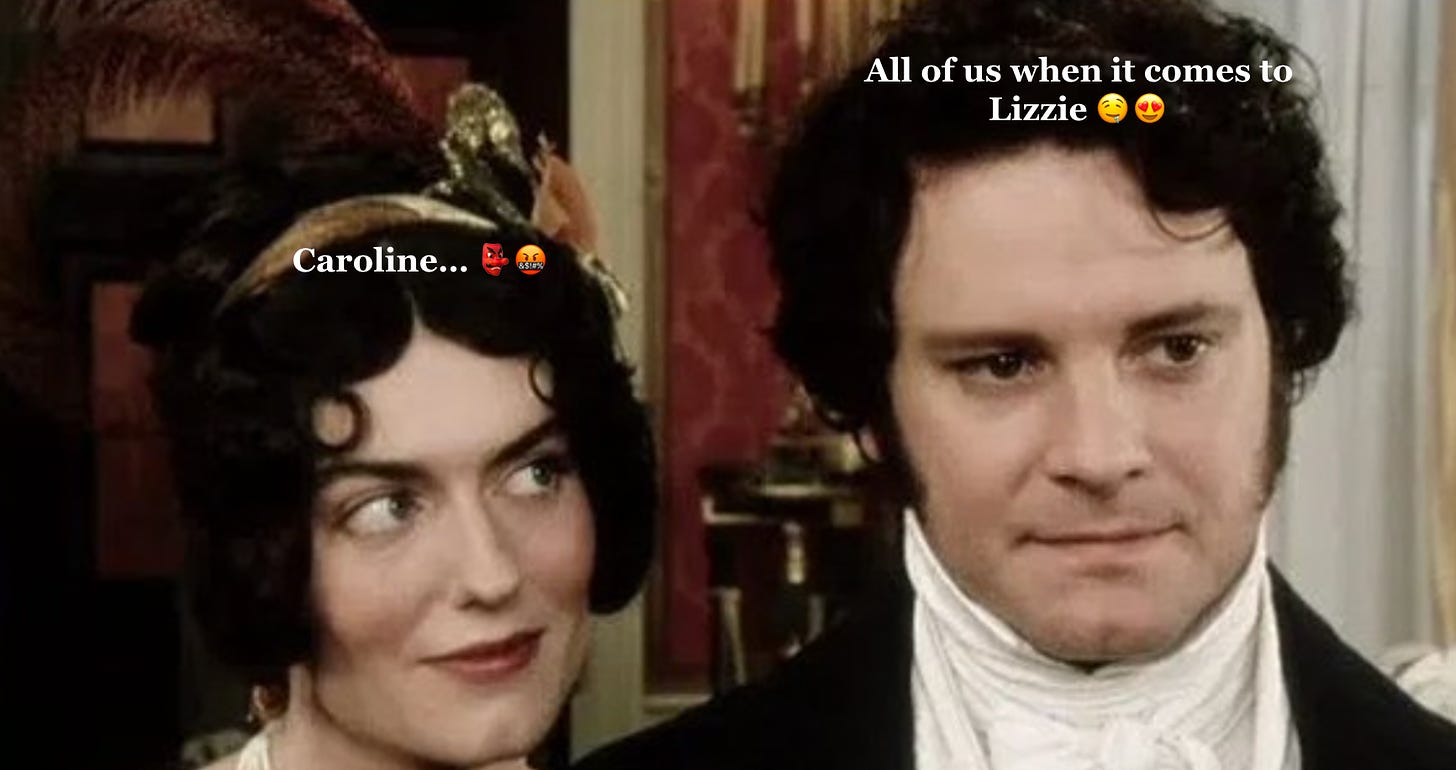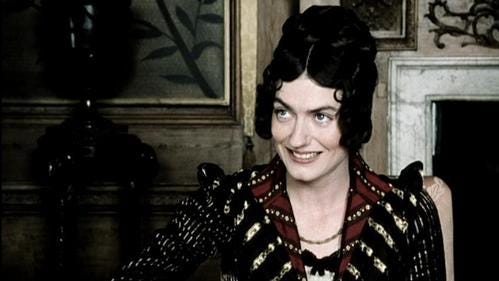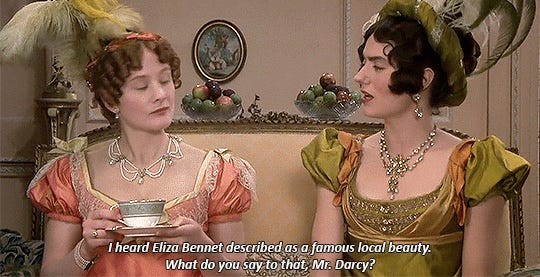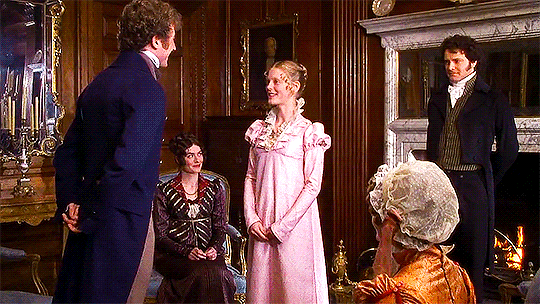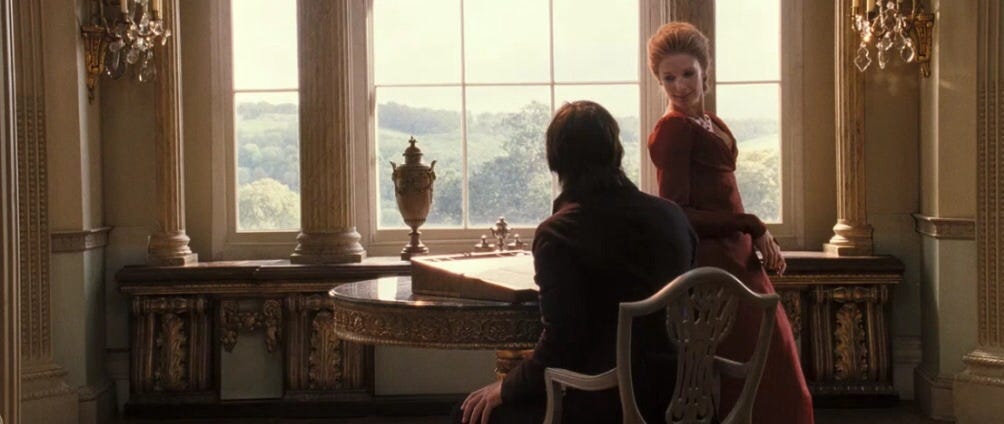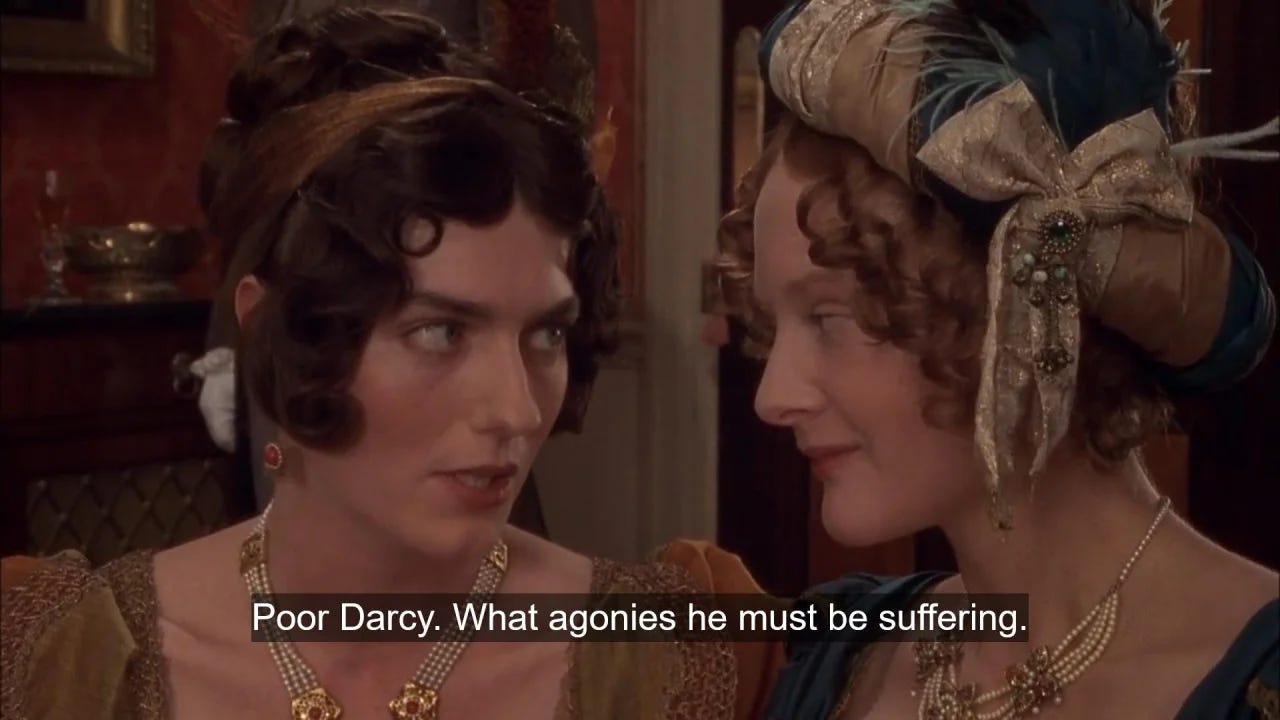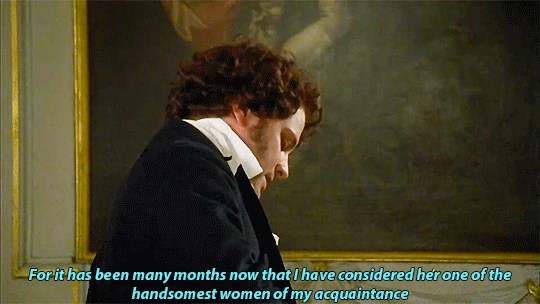Miss Caroline Bingley's Tips for Flirting with a Crush
Why Miss Bingley was never going to be mistress of Pemberley.
“Ugh, Caroline, what are you doing?” you might find yourself yelling every time Mr. Bingley’s unmarried sister speaks to Mr. Darcy in P&P. Whether she’s completely oblivious to Darcy’s disinterest or actually takes pleasure in causing herself pain when he doesn’t respond the way she wishes him to, Miss Bingley can’t help herself: She must flirt; though flirting is not one of her many accomplishments.
Her approach to flirting is certainly more vulgar than elegant: She teases Darcy, looks over his shoulder while he’s writing letters, pretends to be as absorbed in a book as he is. Mostly, we hate her for shit-talking Lizzie in hopes that it will change Mr. Darcy’s admiration for her “fine eyes.” The worst kind of flirt! Please, modern heroines, don’t put each other down just to secure the affections of someone with £10,000 a year.
But if Miss Bingley were to write her own guide to flirting, here’s what it might say:
1. Try to read his mind & sympathize with the misery he feels about being forced to attend a party
Yes, appeal to his snobbery & let him know that you would find it just as “insupportable” as he would “to pass many evenings in this manner.” After all, it’s good to hint to your crush that you have mutual interests.
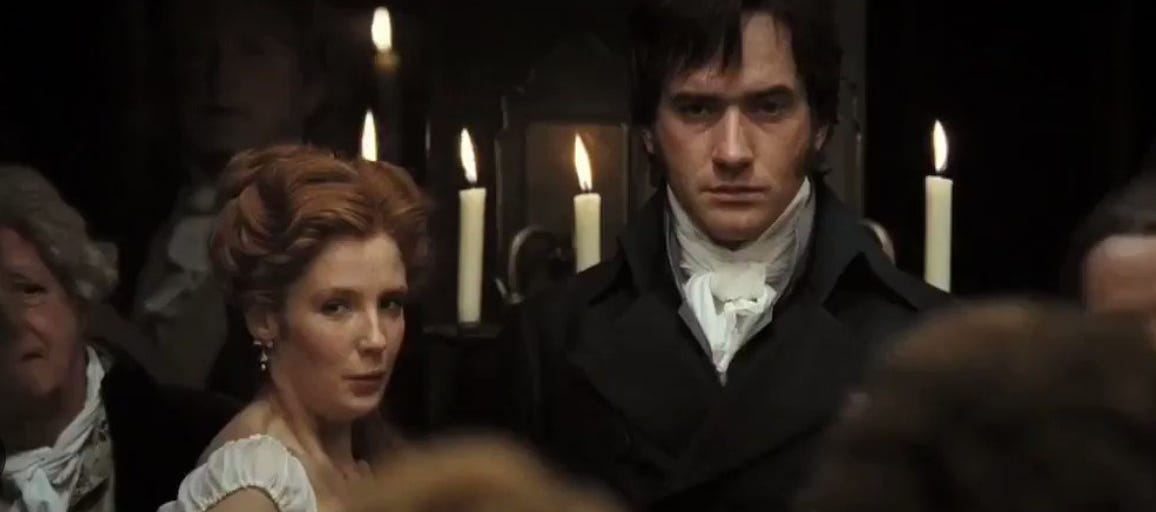
How it’s done:
“I can guess the subject of your reverie.”
“I should imagine not.”
“You are considering how insupportable it would be to pass many evenings in this manner—in such society; & indeed I am quite of your opinion. I was never more annoyed! The insipidity & yet the noise; the nothingness & yet the self-importance of all these people!—what would I give to hear your strictures on them!”
Pride & Prejudice, volume I, chapter 6
2. Tease him about the woman he finds attractive by inquiring when the wedding shall be
As soon as you learn that the “fine eyes” your crush is “meditating on” don’t belong to you, inquire who the lucky woman is & request to know the wedding date—”pray, when am I to wish you joy?” If he is severe on your sex because you’ve allowed your imagination to jump to matrimony, be sure to draw his attention to the “charming mother-in-law” he will gain from the alliance.
How it’s done:
“Your conjecture is totally wrong, I assure you. My mind was more agreeably engaged. I have been meditating on the very great pleasure which a pair of fine eyes in the face of a pretty woman can bestow.”
Miss Bingley immediately fixed her eyes on his face, & desired he would tell her what lady had the credit of inspiring such reflections. Mr. Darcy replied with great intrepidity,
“Miss Elizabeth Bennet.”
“Miss Elizabeth Bennet!” repeated Miss Bingley. “I am all astonishment. How long has she been such a favourite?—& pray when am I to wish you joy?”
“That is exactly the question which I expected you to ask. A lady’s imagination is very rapid; it jumps from admiration to love, from love to matrimony in a moment. I knew you would be wishing me joy.”
“Nay, if you are so serious about it, I shall consider the matter as absolutely settled. You will have a charming mother-in-law, indeed, & of course she will be always at Pemberley with you.”
Pride & Prejudice, volume I, chapter 6
3. Entreat your crush to join you in bashing the woman whose “fine eyes” he admires
What could Elizabeth Bennet mean by walking 3 miles alone, & in dirt high above her ankles? Direct this question to your crush once the woman has left the room. Make him see that she’s indifferent to decorum, that this “exhibition” (which Mr. Darcy would certainly not wish to see his own sister make) shows “an abominable sort of conceited independence.” Surely, your crush will see you in a better light when you shit on the woman with “fine eyes.”
How it’s done:
Miss Bingley began abusing [Lizzie] as soon as she was out of the room. Her manners were pronounced to be very bad indeed, a mixture of pride & impertinence; she had no conversation, no stile, no taste, no beauty.
[…]
“To walk three miles, or four miles, or five miles, or whatever it is, above her ankles in dirt, & alone, quite alone! What could she mean by it? It seems to me to shew an abominable sort of conceited independence, a most country indifference to decorum.”
“I am afraid, Mr. Darcy,” observed Miss Bingley in a half whisper, “that this adventure has rather affected your admiration for her fine eyes.”
“Not at all,” he replied; “they were brightened by the exercise.”
Pride & Prejudice, volume I, chapter 8
4. Compliment his noble home in hopes that it will be yours one day
Pretend to care about your crush’s family library, for you know him to be an excellent reader. Then, pay him the compliment of telling your brother to be sure to build a home equal to Pemberley.
How it’s done:
“I am astonished…that my father should have left so small a collection of books.—What a delightful library you have at Pemberley, Mr. Darcy!”
“It ought to be good…it has been the work of many generations.”
“And then you have added so much to it yourself, you are always buying books.”
“I cannot comprehend the neglect of a family library in such days as these.”
“Neglect! I am sure you neglect nothing that can add to the beauties of that noble place. Charles, when you build your house, I wish it may be half as delightful as Pemberley.”
Pride & Prejudice, volume I, chapter 8
5. Always praise his sister!
Think of something to ask your crush about his little sister…oh, yes! Her height! Has she grown since you last saw her? Is she uncommonly tall? Follow up with praise of her accomplishment on the pianoforte. Exaggerate to make it sound genuine.
How it’s done:
“Is Miss Darcy much grown since the spring?” said Miss Bingley; “will she be as tall as I am?”
“I think she will. She is now about Miss Elizabeth Bennet’s height, or rather taller.”
“How I long to see her again! I never met with anybody who delighted me so much. Such a countenance, such manners!—& so extremely accomplished for her age! Her performance on the pianoforte is exquisite.”
Pride & Prejudice, volume I, chapter 8
6. Be “one of those young ladies who seek to recommend themselves to the other sex, by undervaluing their own”
It’s the very thing Miss Bingley accuses Elizabeth Bennet of doing in volume I, chapter 8, which is really just holding a mirror up to her own flirtatious behavior.
How it’s done:
“Eliza Bennet,” said Miss Bingley, when the door was closed on her, “is one of those young ladies who seek to recommend themselves to the other sex, by undervaluing their own; & with many men, I dare say, it succeeds. But, in my opinion, it is a paltry device, a very mean art.”
“Undoubtedly,” replied Darcy, to whom this remark was chiefly addressed, “there is meanness in all the arts which ladies sometimes condescend to employ for captivation. Whatever bears affinity to cunning is despicable.”
Miss Bingley was not so entirely satisfied with this reply as to continue the subject.
Pride & Prejudice, volume I, chapter 8
7. Commend your crush on the neatness of his handwriting
Never mind that he probably wants privacy while he writes a letter to his sister—look over his shoulder & wonder how he can keep his lines so even. This is another opportunity to inquire after his sister: “Pray tell your sister that I long to see her.” He may be silent in receiving your praise, but that’s only because he’s not in need of it.
How it’s done:
Mr. Darcy was writing, & Miss Bingley, seated near him, was watching the progress of his letter, & repeatedly calling off his attention by messages to his sister.
The perpetual commendations of the lady either on his handwriting, or on the evenness of his lines, or on the length of his letter, with the perfect unconcern with which her praises were received, formed a curious dialogue.
“How delighted Miss Darcy will be to receive such a letter!”
He made no answer.
“You write uncommonly fast.”
“You are mistaken. I write rather slowly.”
[…]
“Pray tell your sister that I long to see her.”
“I have already told her so once, by your desire.”
“I am afraid you do not like your pen. Let me mend it for you. I mend pens remarkably well.”
“Thank you—but I always mend my own.”
“How can you contrive to write so even?”
He was silent!
Pride & Prejudice, volume I, chapter 10
8. Continue to tease your crush about the woman he prefers to you. Point out the degradation such a connection will be to his family
Perhaps he could improve the Lady’s relations, for they bear all that “country indifference to decorum.” The Lady, herself, could certainly stand having someone check “that little something bordering on conceit & impertinence.” And do help him imagine the portraits of her family members that will hang in the gallery at Pemberley.
How it’s done:
She often tried to provoke Darcy into disliking her guest, by talking of their supposed marriage, & planning his happiness in such an alliance.
“I hope…you will give your mother-in-law a few hints, when this desirable event takes place, as to the advantage of holding her tongue; & if you can compass it, do cure the younger girls of running after the officers.—And, if I may mention so delicate a subject, endeavor to check that little something, bordering on conceit & impertinence, which your lady possesses.”
“Have you anything else to propose for my domestic felicity?”
“Oh! Yes.— Do let the portraits of your uncle & aunt Philips be placed in the gallery at Pemberley. Put them next to your great uncle the judge. They are in the same profession, you know; only in different lines. As for your Elizabeth’s picture, you must not attempt to have it taken, for what painter could do justice to those beautiful eyes?”
“It would not be easy, indeed, to catch their expression, but their colour & shape, & the eye-lashes, so remarkably fine, might be copied.”
Pride & Prejudice, volume I, chapter 10
My dear Caroline,
By now you must realize that the man’s not into you, that your teasing & abuse of the woman he prefers will cause pain only to yourself. You might endeavor to check that jealousy & accept your place in the friend zone.
We can let Mr. Fitzwilliam Darcy have the last word on the subject:




